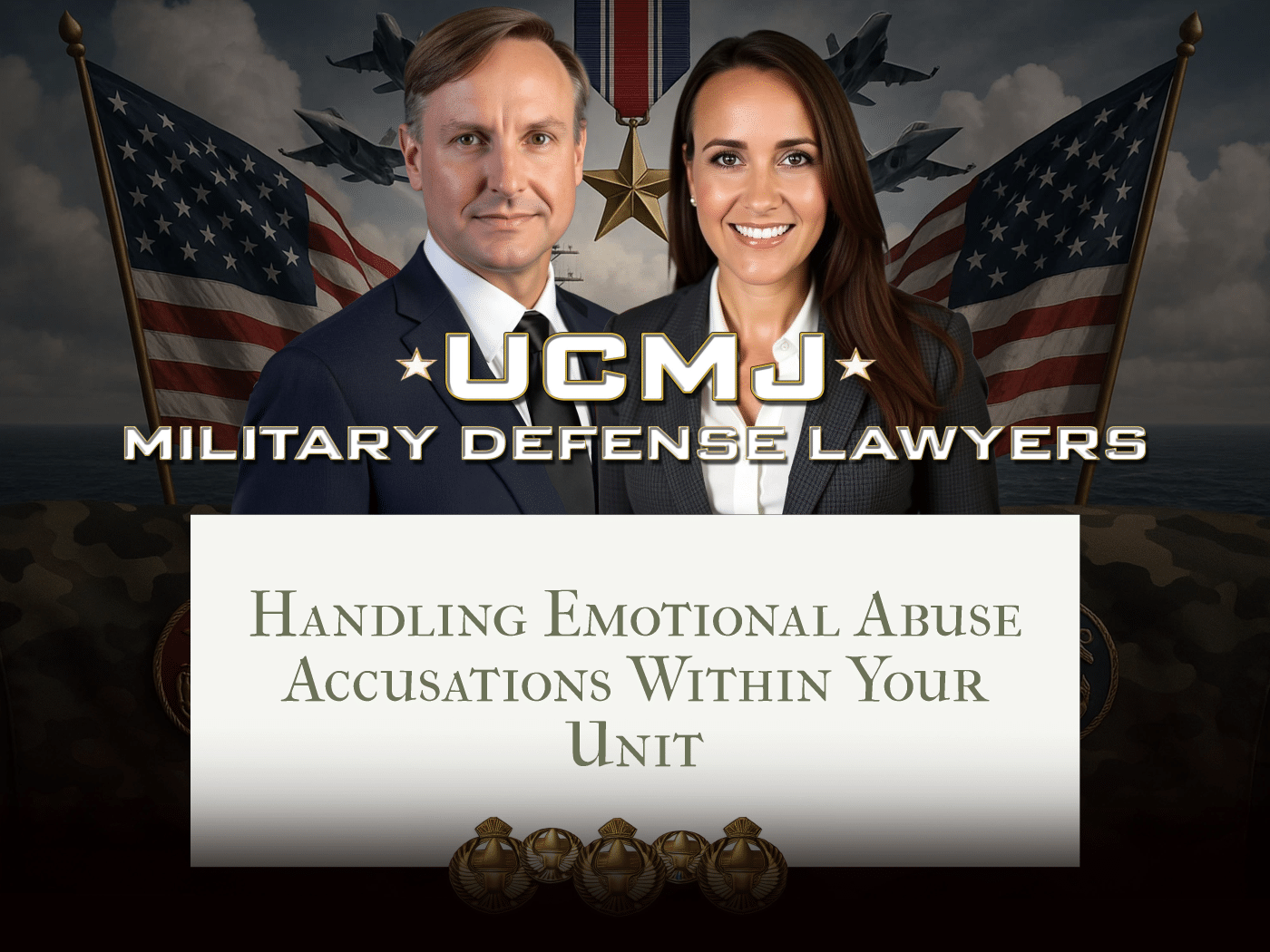When you’re part of a close-knit team such as a military unit, accusations of emotional abuse can shake the foundation of trust and security. Handling these situations with care, integrity, and adherence to protocol is essential. Understanding the Unit Emotional Abuse Response process is the first step toward ensuring the well-being of all involved and maintaining the integrity of the unit. Accusations involving emotional mistreatment can carry serious personal, professional, and legal consequences. Whether you’re a commanding officer, a fellow service member, or the accused, knowing how to navigate this sensitive issue is crucial. It’s not just about legal protection—it’s about preserving the mental health and morale of your unit. This blog sheds light on how the Unit Emotional Abuse Response works, why it’s important, and how you can ensure it’s handled with fairness and professionalism. Most importantly, we explore how legal guidance plays a critical role in achieving just outcomes while supporting all unit members throughout the process.
Grasping the Basics of Unit Emotional Abuse Response
Unit Emotional Abuse Response refers to the formal process through which allegations of emotional mistreatment within a military or governmental unit are reported, investigated, and addressed. Emotional abuse can be difficult to identify compared to physical harm, making the response process crucial. Examples may include a superior repeatedly belittling a subordinate in front of others or isolating a unit member from critical conversations and decisions. These behaviors, although not physically violent, can significantly impact a person’s emotional well-being and workplace performance.
Emotional abuse may also take the form of threats, manipulation, or constant criticism. While occasional conflict is normal in high-stress environments, persistent verbal and psychological aggression may qualify as emotional abuse. A proper Unit Emotional Abuse Response aims to determine the credibility of allegations, protect the rights of all involved, and maintain unit cohesion. Understanding what qualifies as emotional abuse and knowing the avenues for both reporting and defending against such accusations are all part of navigating this complex issue responsibly.
The Importance of Addressing Emotional Abuse Within the Unit
When emotional abuse is left unchecked, it can deteriorate the morale, trust, and functionality of a unit. That’s why a responsible, transparent, and prompt Unit Emotional Abuse Response is so critical. It helps ensure the mental well-being of service members while promoting a culture of respect and accountability. Additionally, it offers a fair platform for those accused to defend themselves in a structured manner, preventing miscarriages of justice.
The ripple effects of poorly managed emotional abuse allegations can extend far beyond the individuals involved. Units can face delays in missions, lower performance, and long-term distrust among members. In contrast, a professionally managed response process strengthens command structures and reinforces ethical leadership practices. Recognizing the serious implications of such accusations is key to addressing them effectively.
- Scenario 1: A junior member accuses their superior of continuous verbal humiliation. The result is a breakdown in team trust that delays critical operations.
- Scenario 2: A commander dismisses emotional abuse claims without investigation. The perceived lack of accountability causes multiple resignations or transfers.
- Scenario 3: A wrongly accused service member is socially isolated during the investigation. Their performance suffers, and valuable experience is lost from the team.
How the Emotional Abuse Allegation Process Unfolds
- Step 1: An initial report or complaint is filed by the alleged victim or a witness who has observed abusive behavior.
- Step 2: Supervisors or designated officers initiate a preliminary inquiry to determine if the complaint warrants a formal investigation.
- Step 3: If warranted, a full investigation is conducted, including interviews, evidence review, and collection of witness statements to arrive at a resolution.
Best Practices for Handling Emotional Abuse Allegations Within a Unit
Common Questions About the Unit Emotional Abuse Response Process
How Gonzalez & Waddington Helps You Navigate These Complex Situations
Gonzalez & Waddington specializes in military defense and understands the sensitive nature of unit-based emotional abuse claims. With years of real-world experience representing clients in emotionally charged and high-stakes legal matters, this firm approaches each case with compassion, discretion, and focused legal expertise. Their team provides not only legal defense for the accused but also consultative support for units dealing with internal investigations. From pre-investigation strategy to courtroom advocacy, González & Waddington offers services that protect your career, your reputation, and your peace of mind. Their personalized care and specialized knowledge in military law make them a leading choice for those facing emotionally complex legal challenges.


